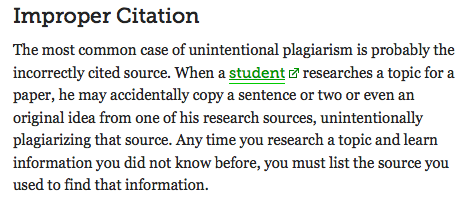Unless I’m your only source to news from within Christian discussions, you’ve probably heard over this last week of the brewing Mark Driscoll scandal where he was caught plagiarizing in a few of his books. This case, is perhaps a slam dunk case of plagiarism as it gets, lifting whole passages nearly world-for-word from works which were not his own, without citing the original author.
Pure and simple, it’s plagiarism. Yet for some reason, “Pastor Mark” seems to be getting a free pass on this other than backlash in the blogosphere.
An article I read yesterday morning in Christianity Today by Andy Crouch provided another troubling example of this (though I agreed with 60% of the article and am simply adding to the dialogue, not critiquing Crouch). In the piece, Andy Crouch argues that we shouldn’t be calling this plagiarism, but simply a “mistake”:
“As for the unattributed copying in the church’s Bible study guide, by “Pastor Mark Driscoll”: this was, without a doubt, improper use. But rather than tar it with the explosive word plagiarism, with that word’s connotations of intent to reap rewards by presenting others’ work as one’s own, why not simply call it a mistake?”
I am troubled to simply call it “improper use” and a “mistake”, and that others are calling it an “improper citation” because it holds Driscoll to a completely different standard than what just about everyone else would be held to. Furthermore, it completely glosses over the fact that improper citation, is in fact, plagiarism. Driscoll is getting a free pass on a standard that we expect 12 year olds to understand.
In fact, I did a quick Google search for a few different Jr High School websites, and within three clicks ended up on the site of Johnsburg Junior High School, in Johnsburg, IL. On a page entitled “Copyright” help, we find the following:
“Why does my teacher say I have to “cite properly or it’s plagiarism?”
Because if you do not cite properly you are saying the work is yours and you are stealing the intellectual property; plagiarizing. Intended or not, improper citation is plagiarism.”
So, to get this straight: if a 6th grader copies an author nearly word-for-word, and doesn’t cite the original source, it is plagiarism. If Mark Driscoll copies an author nearly word-for-word without citing the author, it is “improper use” or a “mistake”. Even if Mark were to spend a few minutes on ehow.com, he’d find:
Some have said that it was the mistake of the team that helped write the books for him, but that Mark’s name took credit for the group work because that’s the “industry standard”. This is troubling once again– I recall my last class at Gordon-Conwell (Church Planting) and an assignment that could be competed individually or in a group. The professor warned us “if you work in a group, but do not list all of the team members on your paper, I will fail you and have you thrown out for plagiarism.” And, I’m quite sure he meant it.
So, here’s where we’re at: the official answer we’re being given is that Mark Driscoll should not be held to 6th grade standards, or that of someone with basic dial-up internet access and knowledge of how to use Google, and that he shouldn’t be held to the same standards as a seminary student.
Instead, we should just call it a mistake and move on.
Here’s the problem: the rest of us don’t get to plagiarize and simply get off by calling it a “mistake” or “inappropriate citation”. Students who do this fail courses and get kicked out of schools. People lose jobs over it (Mark himself has said that pastors who plagiarize sermons shouldn’t be in ministry), and can even get sued for copyright infringement.
But when it comes to Mark? It was just a mistake– and not even his mistake– it was the mistake of his ghost writer who did the writing for him (a completely different ethical discussion that I’m glad is happening as a result of this scandal).
Imagine if we applied this excuse-laden logic to other breaches of ethics/sins:
“No, your honor, I didn’t steal that– I just inappropriately walked out with it before stopping at the cash register. It was just a mistake.”
“No, that wasn’t adultery. I just inappropriately slept with that guy’s wife. It was a mistake.”
Obviously, this type of excuse making instead of taking individual responsibility, wouldn’t fly. It should be troubling for all of us that when it comes to a powerful Christian celebrity, this logic apparently does.
Perhaps the most valuable discussion that is currently happening regarding this case, is an exploration of the “real problem”. Many are realizing that the plagiarism itself is not the biggest concern that arises from this– which I wholeheartedly agree. The potential good which could come out of this, I believe will be found in the discussion of “why is Mark Driscoll getting away with this, without so much as an apology?” In the CT piece, Crouch argues that the real problem is found in idolatry of Christian celebrities– an argument I mostly agreed with, but don’t think is the most concerning issue at the table right now. I feel the bigger problem with this situation is a little bit different:
The problem is power.
Mark Driscoll is presumably rich, and certainly powerful. He commands a massive audience, produces huge content, and is single handedly responsible for generating a great deal of wealth for the people who produce and sell his stuff. Mark Driscoll holds power, and those who are getting rich off him must protect him– not because it’s the ethical thing to do– but because it is the most profitable thing to do.
The situation reminds me of the scene in Mel Gibson’s Braveheart– just before executing his wife, they state: “An assault on one of the King’s soldiers, is an assault on the King himself.”
When Ingrid Schlueter, a part-time producer for Janet Mefferd (the radio host who first broke the story), resigned in protest of the situation, her statement revealed that the real problem is one of power:
“All I can share is that there is an evangelical celebrity machine that is more powerful than anyone realizes. You may not go up against the machine. That is all. Mark Driscoll clearly plagiarized and those who could have underscored the seriousness of it and demanded accountability did not. That is the reality of the evangelical industrial complex.”
In this case, it seems that going after Mark is like going after the powerful people behind him– something that is a losing battle. Were Pastor Mark not a celebrity cash machine with tons of influence, this story would be playing out in an entirely different way.
The less influential, the less powerful, would not be getting a free pass on plagiarism– and certainly would not be getting away without even so much as an apology.
This, is a problem of power.
Unfortunately, scripture has a thing or two to say about treating the poor differently than the rich, or the powerful different than the weak. Speaking in the context treating the rich and powerful by a different standard than the poor and weak, James reminds us:
“…But if you show favoritism, you sin and are convicted by the law as lawbreakers.” James 2:9
As Jesus followers, we ought to be treating the powerless in the same way we treat the powerful. The poor, ought be treated in the same way as the rich. If God is not a respecter of persons, neither should we.
But in this case, it seems the powerful will prevail and justice will be ignored.
I pray we will learn from this situation, repent of our idolatry of Christian celebrities, and repent for not holding those in power to the same account we would the less influential.
If plagiarism is wrong, it should be wrong even for Mark Driscoll.













